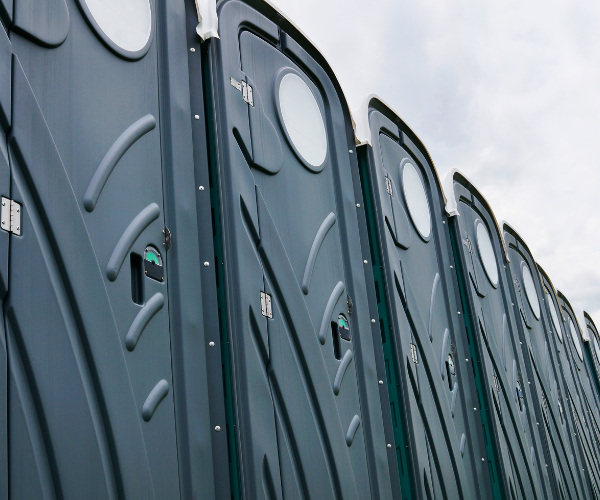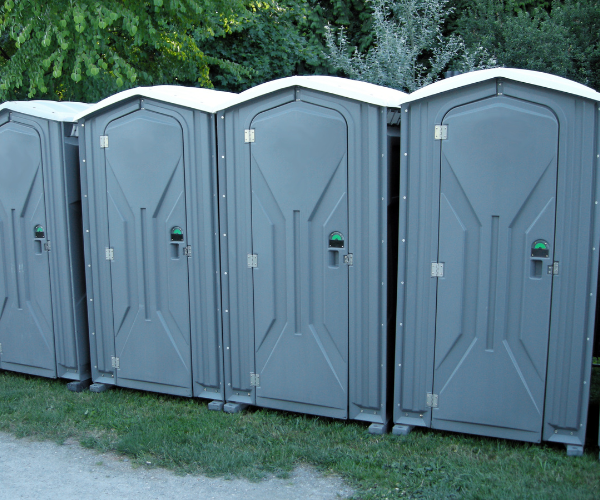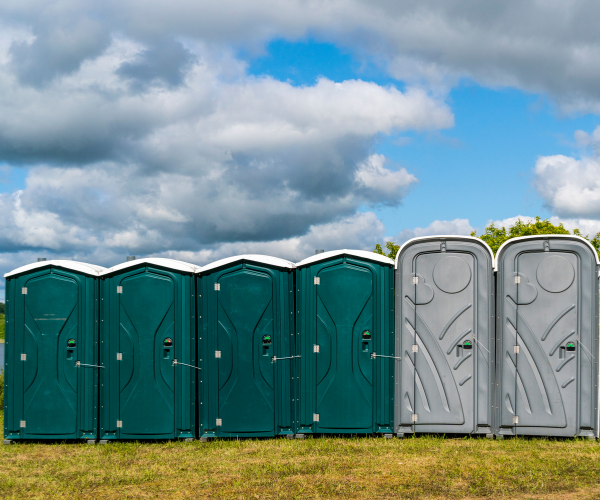Portable toilets offer numerous eco-friendly advantages which are crucial in both urban and rural settings. They are specifically designed to minimize contamination and promote sustainable waste management. By using less water than traditional flush toilets, portable toilets significantly reduce water wastage. Their efficient design means that even mobile units ensure waste is confined and collected for proper treatment. This approach prevents groundwater contamination, a key concern with conventional sewage systems. Furthermore, portable toilets contribute to reducing the carbon footprint, as they are often serviced and transported in a way that aligns with efficient route planning, reducing unnecessary emissions. The materials and chemicals used in these toilets are chosen for their biodegradability, further enhancing their environmental friendliness. Biodegradable cleaning agents and waste treatment chemicals ensure that biodegradable waste is broken down responsibly without harmful residues. Lastly, by providing essential sanitation facilities at large events or construction sites, portable toilets help manage and contain human waste, directly contributing to improved public health standards. This also reduces the impact on local sewage systems by decentralizing waste management.

Portable Toilet Rentals in Greenwood County, South Carolina
Call today for a free quote (864) 477-7907
Portable Toilet
Fast, Easy, & 100% Free To Get Started
Over 20 Years Of Experience
With over 20 years of experience, LittleJohn Toilets has built strong community roots in Greenwood County. Our commitment to quality ensures your satisfaction with every rental.
Unmatched Quality Service
LittleJohn Toilets delivers unparalleled service quality through its commitment to excellence. Count on us for reliable and clean portable toilet solutions you can trust.
Fast and Reliable Delivery
At LittleJohn Toilets, we provide swift and dependable delivery, ensuring your portable toilet rentals reach you promptly and in top-notch condition every time.
Clean Portable Toilet Solutions in Greenwood County
Call for a Free Quote Today
(864) 477-7907
Positioned as a trusted name in Greenwood County, LittleJohn Toilets proudly delivers dependable, reliable, locally-owned portable toilet services. We offer high-quality sanitation solutions for construction sites, parties, festivals, and weddings, ensuring cleanliness and comfort. Our commitment to client satisfaction extends throughout Greenwood County and nearby areas. Whether planning a large event or managing a construction project, our portable toilets are the ideal solution. Choose us for reliable deliveries, impeccable maintenance, and a strong focus on environmental sustainability. Partner with us to ensure your event or job site features the best facilities.


Our standard porta john rental units are durable and reliable for any commercial build site, housing development, public works project, or remodel job.Features include dome lighting, grated floors, and an “In-Use” locking mechanism for privacy and comfort. Regularly maintained, inspected, and cleaned by FusionSite at your location.

Developed as an alternative to full ADA-compliant restrooms, the Liberty is a spacious, wheelchair-accessible unit that can also be promoted as a family-sized restroom. Includes a patented flat-floor system for easy wheelchair access and maneuverability.Handrails, paper holder, and rotary latch are designed for simple, intuitive end-user operation.

Portable hand washing stations are essential for keeping your work site sanitary and clean. Features hands-free foot pumps, liquid soap, and paper towels.Perfect for job sites without water hookups, these units can handle hundreds of washes between services.
We Proudly Serve
Standard Portable Toilets
Standard Portable Toilets in South Carolina offer essential sanitation solutions with high durability and cleanliness.
High Rise Portable Toilets
High Rise Portable Toilets cater to construction sites and tally with safety and accessibility features across Greenwood County.
Restroom Trailers
LittleJohn Toilets' Restroom Trailers in Greenwood County deliver luxury and mobility for upscale events and special occasions.
Roll off Dumpsters
Roll off Dumpsters by LittleJohn Toilets offer seamless waste management services for projects across Greenwood County.
Septic Tank Cleaning
Septic Tank Cleaning services by LittleJohn Toilets efficiently address sanitation needs in South Carolina.
Grease Trap Cleaning
Grease Trap Cleaning in Greenwood County ensures optimal operation and compliance with environmental standards.
Fencing & Barricades
Fencing & Barricades at LittleJohn Toilets, South Carolina, fortify event spaces and construction sites with secure solutions.
Residential Storage
Residential Storage solutions in Greenwood County provide secure and convenient options from LittleJohn Toilets.
Greenwood County Portable Toilet and More
Obtaining a quote for our portable toilets is a streamlined process designed for your convenience. Simply fill out a brief form with basic contact details like your first and last names, phone number, and email. With 'Get A Quote' buttons located conveniently throughout our website, you're just clicks away from accessing our services. Delivery arrangements are equally straightforward, with a commitment to ensuring timely and efficient service. Items are delivered directly to your specified location, ensuring minimal hassle and maximum convenience. Our friendly staff is always ready to help, providing you the information you need for a seamless experience.

Portable Toilets: The Greenwood County Advantage Greenwood County, with its unique blend of local charm and outdoor attractions like the iconic Park Seed Festival and the beautiful Lake Greenwood, is the perfect setting for using LittleJohn Toilets' portable toilet services. Our offerings are tailored to meet the specific needs of community events and nature-loving gatherings, ensuring that your guests enjoy a clean and reliable service. Whether you're planning an event beneath the Carolina blue sky or along the scenic trails, our portable toilets are a must-have. Enhancing Your Event Experience At LittleJohn Toilets, we believe in elevating the guest experience for every event. From community gatherings to large-scale festivals, our portable toilets provide necessary convenience, leaving a lasting impression of satisfaction. Our expert service ensures that all facilities are adequately stocked and maintained, making sanitation smoother than ever. We're committed to Greenwood County—offering the best in class service consistently drives us, keeping us a preferred choice among locals.
Why We're the Best in Greenwood County Our position as the leading portable toilet rental service in Greenwood County revolves around understanding client priorities: reliability, convenience, and exceptional service. At LittleJohn Toilets, we take pride in our local roots and longstanding excellence in the community. We deliver comprehensive services tailored to diverse needs, from bustling public events to intimate family gatherings, ensuring a clean, comfortable experience for all. Commitment to Excellence LittleJohn Toilets stands out for its unmatched quality and dependability. We focus on client satisfaction, with a friendly team eager to assist at every step. Choosing us means aligning with experts dedicated to ensuring a sanitary and successful event or worksite. Our extensive inventory and flexible rental options make us the top choice for portable toilet rentals in Greenwood County.
Reliable Services You Can Trust At LittleJohn Toilets, we set the bar high with our swift and dependable portable toilet services in Greenwood County. Understanding the vital role of sanitation solutions, we prioritize prompt delivery and consistent maintenance to fulfill your requirements. Efficiency at Its Best Our stellar service is rooted in years of expertise, ensuring quick responses and dependable sanitation facilities. From the first call through delivery and pick-up, we emphasize efficiency, offering a seamless experience. With a comprehensive selection to suit any occasion, our team stands ready to deliver clean and functional toilets to your location right when you need them.
Explore Greenwood County Portable Toilets
Renting a portable toilet in Greenwood County is a straightforward process with LittleJohn Toilets. We have designed our rental procedures with user convenience in mind. Locating the rental form at the top and bottom of our webpage, you can easily access the service. The form requires your first name, last name, phone number, and email to proceed. Alternatively, click any of the 'Get A Quote' buttons strategically situated on our website for direct access. Once you submit the necessary information, our team contacts you promptly. We provide a seamless service, ensuring the rental procedure is hassle-free from start to finish. The comprehensive support we offer throughout ensures you receive the best portable toilet solutions, timely delivery, and responsive customer support for all your sanitation needs.
We understand the importance of timely service, which is why LittleJohn Toilets strives to ensure prompt delivery for all portable toilet orders. The typical delivery timeframe can vary depending on location, current demand, and specific client needs, but we generally aim for a swift turnaround from order confirmation to delivery. Typically, most orders are fulfilled within 24 to 48 hours. Our priority service ensures quick deployment of units, especially for urgent requirements and last-minute event planning. On confirming your order, our team communicates the scheduled delivery timeframe, offering both standard and expedited service options to suit diverse situations. We pride ourselves on our reliability, emphasizing efficient logistics and pre-planned routes to uphold our commitment to timeliness. We also offer flexible scheduling, with delivery and pick-up tailored to suit your event timeline, ensuring a seamless experience from start to finish.
Yes, we can service any type of event or construction service requirement. At LittleJohn Toilets, we pride ourselves on offering comprehensive sanitation solutions for all occasions. Whether you're hosting festivals, sporting events, or looking to service weddings and corporate gatherings, we have the right portable toilets to meet your needs. With luxury restroom trailers, porta-potties, and additional options like roll-off dumpsters and fencing, we ensure you've everything necessary for a successful event. Our ADA units and portable sinks with hand sanitizer stations cater to accessibility and hygiene standards, enhancing guest comfort. Our versatile offerings and commitment to exceeding client expectations position us as a leader in the portable sanitation industry.

